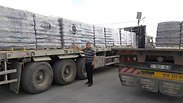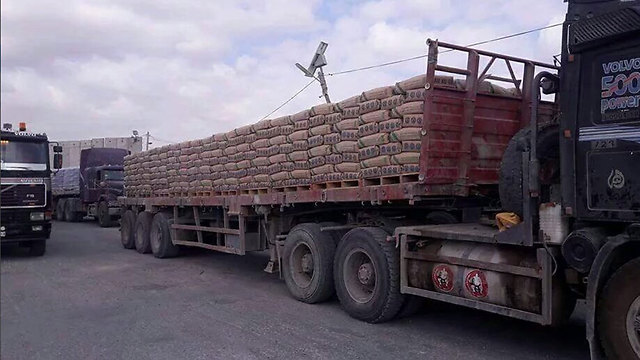
Israel lifts ban on private cement imports to Gaza
Shipments stopped after Hamas diverted cement supplies to its military branch, likely to be used for attack tunnels, but resumed this week following agreement to increase international monitors on Palestinian side of border.
"In accordance with the security assessment and the understandings reached with the international community, as of today, Sunday May 22, the re-entry of cement into Gaza has been approved," said a statement from the government body responsible for implementing policies in the Palestinian territories, COGAT.
Nickolay Mladenov, the UN Special Coordinator for the Middle East Peace Process, welcomed the resumption of the shipments, saying in a statement that "all sides need to ensure that cement deliveries reach their intended beneficiaries and are used solely for civilian purposes."
The ban was imposed in early April, with Israel accusing Imad al-Baz, deputy director of the Hamas economy ministry, of diverting supplies to Hamas's military branch, likely to be used for its smuggling and attack tunnels.
Supply of cement to international reconstruction projects, however, continued uninterrupted, as it operates on a different mechanism to that of the private sector.
"The exploitation by Hamas is a severe violation of the construction mechanism and the agreement between COGAT, the Palestinian Authority and the United Nations," said Sunday's English-language statement, in response to an AFP query.
Al-Baz has denied the allegation, saying that the imports were conducted in line with a UN-brokered Gaza Reconstruction Mechanism, aimed at allowing for reconstruction following the devastating destruction of the 2014 Operation Protective Edge.
The renewal came following talks between Israeli and Palestinian officials and Mladenov. The two sides agreed to increase the number of international inspectors on the Palestinian side of Kerem Shalom and to dismiss al-Baz, according to COGAT.
The first of some 90 truckloads of cement entered the Gaza Strip through an Israeli-controlled border crossing on Monday and Palestinian officials said they expected some 4,000 tons of the material would be brought in by the end of the day.
"But this can be reversed if we see another (Hamas) violation," an Israeli official told Reuters.
Over 1.2 million tons of construction materials have entered Gaza since the mechanism was set up in 2014.
According to an Israeli official, 80 truckloads of cement enter Gaza weekly, each one carrying 40 tons.
The United Nations said 140,000 houses were partially or completely damaged during Operation Protective Edge. Some 2,100 were killed on the Palestinian side, while on the Israeli side 67 soldiers and six civilians were also killed.
Adnan Abu Hasna, media adviser for the United Nations Relief and Works Agency (UNRWA) in Gaza, said 1,000 houses were currently under reconstruction and 70,000 other homes with minor damage have been repaired. Another 1,000 houses were completely rebuilt by Qatar.
UN officials and international visitors to the region in past weeks have urged Israel to speed up the entry of construction material into Gaza to speed up the rebuilding process.
Israel has imposed a blockade on Gaza since 2006. Palestinian militants in Gaza and the Jewish state have fought three wars since 2008.
In recent months, Israel has uncovered two border-crossing tunnels built after the 2014 that could be used to attack Israel. Hamas officials say any such tunnels would be defensive in nature.











